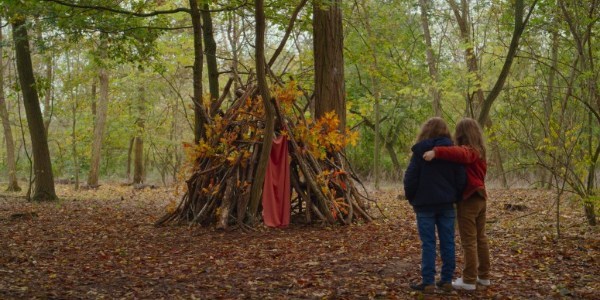Berlinale 2021: PETITE MAMAN
What would you do if you had the chance to go back to the past and meet your parents when they were the same age as you? That’s the main question and the basic premise of Céline Sciamma‘s fifth directorial feature, Petite Maman. Following her piercing queer romance Portrait of a Lady on Fire, the French auteur has made a gentle and heartfelt film about child wonder and imagination, with an exploration of grief and motherhood, and plenty of references from Miyazaki‘s films, at the heart of the movie.
Nelly & Marion
Nelly (Joséphine Sanz), the protagonist of the movie, is an 8-year-old girl who might be a little too young to deal with what just happened in her life: her grandmother died before she even has the chance to say a proper goodbye. Her mom (Nina Meurisse) is not exactly doing better either. The grief is a little overwhelming for her to handle, and it’s understandably so. Inside the car on the way home to grandma’s house to pack all her belongings, Nelly tries to comfort her mom by feeding her cheese puffs and a carton of juice from the backseat of the car. A smile appears, even though the pain is still palpable.
When Nelly and her parents finally arrive at the house, a sense of sadness and emptiness fills every corner of the room — so much so that the mom decides to leave the next day because everything about the house reminds her of the pain she’s currently feeling. Left only with her easygoing dad (Stéphane Varupenne), Nelly tries to have fun by playing paddle ball at the back of the house. That’s where she meets a girl the same age as her, building a fort in the forest. Not only does this girl share an uncanny resemblance to Nelly, she apparently has the same name as her mom, Marion.
The two hit it up instantly. They share stories and laugh. The bond between them seems as real as it can get. When the rain comes pouring down, the two of them run quickly to Marion’s house, and before long, Nelly realizes that it’s the same as her grandmother’s house, only now, it feels more alive. Could it be that Marion is indeed Nelly’s mom when she was the same age as her? Could the fort she’s currently building be the same one that Nelly’s mom told her about before? Or is it all just an imagination run wild?

While the time-travel proves to be intriguing, Petite Maman‘s main focus is never on the mechanic of it all, as Sciamma is more interested in observing the relationships between the two girls, especially in how Nelly sees this brief encounter with the young Marion as an opportunity to connect with her mom on a deeper level; to really see her not just as her mom, but as a human being, as Marion. In that sense, the movie encourages us to understand our parents beyond the familial connection that we have with them.
Sciamma clearly understands that we and our family are first and foremost human beings. And through Petite Maman, that’s what she’s trying to remind us; to see our parents simply as human beings so that we can understand them on a more meaningful level. That all of this is told from the perspective of a young girl, with a touch of magical realism coming into play, gives the film an additional sense of innocence and sweetness.
Sciamma Never Misses
At the heart of the movie are the exquisite performances of the Sanz twins. They know how to act mature, yet at the same time still retaining the purity and endearingness of 8-year-old girls. When Nelly and Marion are having fun together playing roles or making pancakes or slurping soup, the warmth and intimacy shown by the actors filling the frame. Sciamma never undermines the lead character’s curiosity. In fact, it’s in that curiosity where the magic of the film happens. Looking back at the director’s filmography, this actually shouldn’t come as much of a surprise. Her first three features all focus on childhood, and she never fails at drawing stellar performances from the young performers of each of those films.
While the overall tone of the movie is melancholy, Sciamma never leans too much into sentimentality. The emotions are always on the right level. Music is rarely used; the one time it is utilized is at the cathartic climax of the film. The visual, shot beautifully by Claire Mathon, is crisp, basked in a thick autumnal light to add more comfort. Yet underneath that simplicity, there is so much beauty and complexity.
Petite Maman, all in all, shows Sciamma at her most profound and mature. The subject of her story might be two little girls, but the care she puts into the characters and the story shows a director at the top of her game and bringing a great level of maturity. Grab a tissue and prepare your heart if you’re going to see this.
Petite Maman is screened at this year’s Berlinale Film Festival in the main competition.
Watch Petite Maman
Does content like this matter to you?
Become a Member and support film journalism. Unlock access to all of Film Inquiry`s great articles. Join a community of like-minded readers who are passionate about cinema – get access to our private members Network, give back to independent filmmakers, and more.
Join now!




